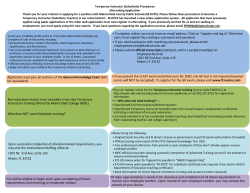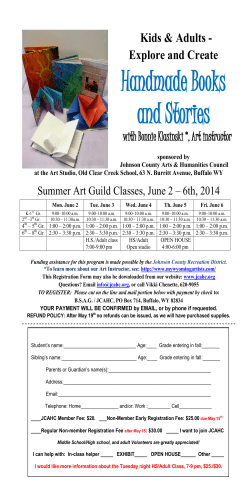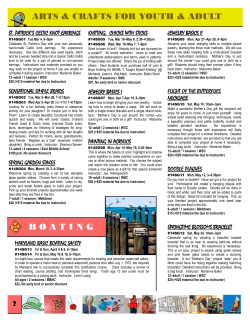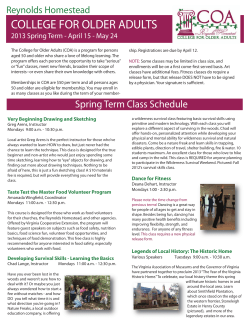
Thank you for your inquiry into the Waterloo-Wellington Flight Centre.
Thank you for your inquiry into the Waterloo-Wellington Flight Centre. Below is a guide to choosing a flight school which can be found on the Transport Canada website www.tc.gc.ca. In an effort to support your investigation of existing flying schools we have addressed the Transport Canada questions and suggestions in reference to Waterloo-Wellington Flight Centre. Our answers are found in teal text. How to Select a Flying School http://www.tc.gc.ca/eng/civilaviation/standards/general-flttrain-selectftu-selection-2334.htm#introduction Introduction Learning to fly is a challenge many Canadians aspire to accomplish. Piloting a light aircraft can be a rewarding adventure that is not only fun but can lead to interesting career and travel opportunities. In the Flight Training Division of Transport Canada, we are regularly asked, "I live in Town or City X, where is the best place to take flying lessons?" Transport Canada is not in the business of ranking flying schools. Our goal is make sure they are all operated safely. However, we can offer some general advice on how to choose a flying school that will suit your needs and budget. If you have little or no aviation experience, selecting a flying school can be overwhelming and is best not done on impulse. Careful consideration of a number of factors will assist you in finding a school that meets your needs. We suggest the following steps: Determine your aviation goals (recreational or career); Identify the type of school that will best serve to achieve those goals; Make a list of schools; Visit the school in person; Assess the bottom-line cost; and Make a choice. Now let’s look at these steps in detail. Step 1 - Determine your aviation goals (recreational or career) Ask yourself these questions: Why do I want to learn to fly? What is my ultimate goal? Do I want to fly for fun? or Am I seeking a flying career? Will my flying be in the local area or will I use a small aircraft for travel? Do I want to own an aeroplane or will I rent? Am I able to train full or part-time? How you answer these questions will significantly affect the school you choose. Step 2 - Identify the type of school that will best serve to achieve those goals Everyone who flies in Canada must hold a pilot licence or permit. The training to obtain these is regulated by the Canadian Aviation Regulations (CARs). Schools offering training for "recreational" flight training, i.e. ultra-lights, balloons, gliders or gyroplanes, must advise Transport Canada of where they are operating and who the principal instructor is. Transport Canada is aware of Waterloo-Wellington Flight Centre (WWFC) and we hold a flight training unitoperating certificate (UOCT) issued by Transport Canada. Our Chief Flight Instructor, Mr. Matt Scheben is responsible for ensuring that our flight training school follows Transport Canada training regulations as outlined by CARs. We are also registered as a Private Career College with the Ministry of Training, Colleges & Universities. Schools providing flight training in aeroplanes or helicopters are issued Flight Training Unit Operator Certificates. These schools are subject to stringent operating requirements and periodic inspection by Transport Canada. We follow the stringent operating requirements and continue to meet the standards in the periodic Transport Canada inspections. A third type of flying school is one affiliated with a provincially accredited college or university. These organizations are subject to the same regulations outlined in Part 406 of the CARs and have a complimentary post secondary program leading to a college diploma or university degree. Our private students are able to earn a Private Pilot Licence, Commercial Pilot Licence, Multi-engine Rating, Instrument Rating, Instructor Rating, amongst others. We also have affiliated aviation programs with both Conestoga College and the University of Waterloo. Choosing between a diploma and a degree is a personal choice, however; the flight training component of both programs offer a Private Pilot Licence, Commercial Pilot Licence, Multi-engine Rating, Instrument Rating and approximately 215 flight hours. Step 3 - Make a list of schools Once you have given some thought to what you want, assemble a list of possibilities and request all available literature from each school. Some schools have Internet web sites. Please visit www.wwflightcentre.com for school information. Ask for an outline or curriculum for each program in which you are interested Post Secondary Program guidebooks are available upon request for both the Conestoga College (2 year/5 semester program) and the University of Waterloo (4 year degree program, with a science or geography option) aviation programs by emailing the Postsecondary Program Coordinator at [email protected]. Private students can request outlines of the cost and licence/rating privileges by emailing the Postsecondary Program Coordinator at [email protected] and a copy of the school's regulations and flight operations procedures. Questions in regards to school regulations and flight operation procedures can be answered by emailing our Chief Flight Instructor at [email protected] Do not base your decision on the literature alone!!! Potential students and their families are invited to schedule a complete tour of our facilities, including administrative offices and maintenance by calling 519-648-2213. Do not be misled by glossy pamphlets and catchy sales pitches. Look for informative substance. This can be found in photocopied sheets as well as full-color brochures. While reviewing the material, take notes for verification during the school visit. Some things to look for are: The school's philosophy, goals and objectives. Do they match or come close to yours? The mission of the Waterloo-Wellington Flight Centre is to provide the highest quality and safest environment possible to create pilots and to provide the best possible resources and service support for members of the aviation industry to purse their goals and ambitions. Is there housing, financial aid and additional training available such as aerobatics or multi-engine training to broaden your experience? We currently do not offer housing or financial aid. Our training options are broad and include the above ratings and licences as well as Recreational, VFR, Night Rating, and Group 1 and Group 3 Instrument Rating How long has the school been in business? The Waterloo-Wellington Flight Centre was established in 1932 as a non-profit organization, complete with a governing Board of Directors. Originally known as the K-W Flying Club, we had our beginnings at an old grass strip on Lexington Road in Waterloo. Since then we have grown to be one of the top flight schools in Canada. What are the credentials of the operators? The Waterloo-Wellington Flight Centre holds a Flight Training Unit Operator Certificate that allows the Centre to provide Flight Training for the following licenses and ratings: Commercial Pilot, Instructor Rating, Instrument Rating, Multi-Engine Rating, Night Rating, Private Pilot, Recreational Pilot and VFR OverThe-Top Rating. How many students have graduated? We have had thousands of students graduate from our programs over the past 77+ years. And how many do they have right now? Currently we have well over 200 students pursuing aviation training. What is the classroom facility like? We currently have three new classroom facilities (40 seats; 40 seats; 70 seats) each equipped with computers with PowerPoint capabilities, and one classroom has the addition of an EPSON document camera. What kinds of aircraft are used for training? Our fleet currently consists of 2 Piper Seminoles, 7 Cessna 152s, 7 Cessna 172Ns, 2 Cessna 172Ss, 3 Cessna 172RGs, 3 Diamond DV20, and an ELITE FTD. What kinds of services are available at the airport (control tower, flight service station, etc.)? We posses an excellent fleet of aircraft, tower-controlled airport, multiple IFR approaches, Transport Canada approved GPS approaches, VOR/DME on the field, convenient access from a large parking area, maintenance facilities on site, private briefing rooms, and Internet weather access, as well as a full service restaurant. Step 4 - Visit the school in person If you do nothing else in your search - VISIT THE SCHOOL!! Potential students and their families are invited to schedule a tour of our facilities by calling 519-648-2213. Your first contact will likely be a line instructor or the chief flight instructor. Listen closely and ask questions about everything. Do not be shy. If you do not understand something, ask! During your tour, ensure that no area is left unvisited, from administrative offices to the maintenance area. Some questions to ask are as follows: How does the CFI supervise flight training in the school? The performance of all Instructors is observed on a monthly basis, monthly communication meetings are held with Instructors to keep them abreast of aviation updates to policies and procedures, outcomes are monitored by tracking written and flight test results, and Pilot Training Records are reviewed for completeness and compliance with Transport Canada flight training standards. How many students does each instructor have? The number of students varies per Instructor. Students who are experiencing difficulty scheduling flight training sessions have the opportunity to discuss Instructor changes with the Chief Flight Instructor. Will you have a principal instructor or will your bookings dictate who you fly with? You will be assigned a principal Instructor for the duration of your flight training, unless your Instructor moves onto another position. Personality fits are important in a small cockpit and should you feel the need to change your Instructor, this can be discussed with the Chief Flight Instructor. How is the training scheduled (1.5 versus a 2 hour booking)? An average flight booking is 1.5 to 2 hours, but it is important to note that the flight-training schedule is determined cooperatively between the student and the Instructor based on weather and time. How are cancellations due to weather or maintenance dealt with? Cancellations are discussed between the student and their Instructor, however; failure to arrive for (or cancel at least 12 hours ahead) a scheduled flight lesson dual or solo may result in a cancellation charge being applied to the student’s credit card or account. The fee is calculated using the following formula: 1 hour instructor time @ the current hourly rate. A student’s Instructor determines if the weather is suitable for the planned flight. If the weather is determined to be unsuitable there will be no charge to the student’s account. Is there a no show policy? Yes, the fee is calculated using the following formula: 1 hour instructor time @ the current hourly rate. How are student training records kept and by whom? The flight instructor maintains the PTR and the student is responsible for maintaining an accurate logbook. Both the Chief Flight Instructor and the Post Secondary Program Coordinator conduct student file management. Is groundschool run continuously or on an as required basis? With the post secondary programs groundschool is scheduled within the design of the program. For private students Private Pilot Licence and Commercial Pilot Licence groundschool is offered several times per year. For information on when the next groundschool is being scheduled please call 519-6482213 or visit our website. How does the school's insurance cover you as a student from both personal protection and personal liability perspectives? Currently a student’s flying is covered by our insurance plan. There is exception however in the case of negligence which becomes the financial responsibility of the student. What about Ground School? Learning to fly requires that you develop essential piloting skills. However, another aspect of flight training is the academic knowledge required to understand how, where, and when to fly safely. This is accomplished in ground school. Experienced flight Instructors teach our groundschool classes. Ground school usually takes the form of an instructor teaching a scheduled class over a period of several weeks. Alternatively, a self-paced study program using video or audiotapes and/or computer-based programs may be offered. Which is better depends on you. If you are self-disciplined, a self-starter and self-paced, video programs are excellent learning tools. You can "attend" ground school on your schedule and review the tapes as needed. If you need the discipline of the classroom, the choice is obvious. Perhaps the best option is a combination of the two. Many schools have a traditional classroom ground school and a resource room that contains self-paced materials for additional study. Many schools are also using instrument ground trainers (or simulators) in primary training. They are a real benefit in instrument training. Some are PC based while others are actual mock-ups of training aircraft. Look for a Transport Canada approval to ensure that a simulator will provide credit for training you receive. Even if you cannot credit the time on the ground training, its operating costs are far less than the real aircraft and may actually save you money by helping you learn more quickly. Currently our students have access to an ELITE Flight Training Device (FTD). Check out the training aircraft!! The training aircraft is where you practice in the air what you have learned on the ground. High-wing or low, it does not make much difference. What is important is how well airplane is equipped and maintained. The number of aircraft a school has depends on the number of active students. Generally speaking, one trainer serves four or five full-time students. This ratio may be higher with part-time students. Another consideration is the fleet's mix of primary, advanced, and multi-engine aircraft. Because training aircraft are flown often and sometimes hard, how a school maintains them is important for both safety and scheduling. Ask questions on how the maintenance is carried out and the overall reliability of the school's aircraft fleet. We perform regular maintenance on all aircraft at the WaterlooWellington Flight Centre. We have our own AME staff that is fully qualified to maintain our aircraft in accordance with Transport Canada standards. Meet the flight instructors!! A good flight instructor is a vital key to you becoming a safe and skilled pilot. Do not hesitate to ask questions about the training and the experience of the instructors. The most experienced and highest rated instructor holds a Class I Flight Instructor Rating. The newest instructor has a Class IV Flight Instructor Rating. You could also talk to some of the other students at the school to ask about their instructors. We have a diverse level of Instructors at the Waterloo-Wellington Flight Centre. In total we have 20 flight instructors on staff, all of whom bring lots of experience and 12 that hold a Class 1 or Class 2 rating. All of whom are ready and willing to help you with your level of flight training requirements. A significant number of our current Instructors hold their Airline Transport Pilot Licence (ATPL) as well. The industry experience shared by our Instructors includes Bush Flying, Float Flying, Charter, Scheduled Airline and Medevac. A good way to get acquainted with your instructor is through the familiarization flight. A good way to get to know your instructor at WWFC is through our Introductory Flight that we are pleased to offer at a special rate, (you can review our Introductory Flight information on our website, or call 519-6482213 to book an Intro Flight). During your lesson assess your instructor's attitude. Only you can determine what personality best fits yours. A good instructor is one who strives for excellence and will work with you until it is achieved. He or she is also someone who cares about you not only as a student but as a person as well. If you do not get a good feeling about your instructor do not be afraid to ask to fly with someone else. After your tour, the instructor will probably suggest a familiarization flight. This is offered by the school to get you in the air and experience the fun of flying first hand. This is the best way to get a sense as to how the training will be conducted and how interested the instructor is in providing you with a good service. After going through all of this, ask for references from current students and past graduates. See if they had any problems and how they were resolved. Another information resource may be the local Better Business Bureau or Chamber of Commerce. They can offer insights on the school's business practices. Step 5 - Assess the bottom line-cost Compared to most of your activities, learning to fly is expensive. But remember, you are investing in your education, in skills that will open new worlds and opportunities. Flying is an activity of purpose, personal satisfaction, achievement and pleasure. It is also a never-ending learning process, and as with all education, your initial training provides the foundation for any advanced flight training you may wish to pursue. Looking at the bottom line, you will notice that, adjusting for location and differences in training programs, schools more or less charge about the same. Only you can determine if what you get for your money is fair. As with any other major purchase, if a deal seems too good to be true, it usually is. When comparing costs, make sure you are comparing "apples to apples". Some schools base their prices on the Transport Canada minimum-time requirements, for example 45-hours for a private pilot licence. Others base their prices on an "average completion time" figure. Some include books and supplies, ground school, flight testing and written examination fees. Others do not. In the other words, read the fine print and ensure that you are making a comparison of equals. Most schools in Canada allow you to pay for your training as it occurs. Private students are able to pay for their training as they go, however; post secondary students are required to follow a tuition payment plan. Some schools offer financing, and others have connections to financial institutions that can provide loans for flight training. There are two RBC branches, as well as 3 Libro Credit Union branches, that are familiar with our program costs and may be able to assist you with your flight training expenses. For our RBC or Libro contact information please contact the Post Secondary Program Coordinator at [email protected] Some schools also offer "block-time" prices if you pay in advance for a certain amount of training or flight time. This can often offer substantial savings. Some schools guarantee their training - which you will earn your permit/licence for a fixed price no matter how long it takes. Read the fine print carefully, because many of these guarantees expire after a certain number of flight hours. If you have not achieved your goal in this time, the school will still train you, but you will have to pay for the training that takes place above the guarantee's ceiling. Inquire about refunds. If you have pre-paid for flight training and circumstances prevent you from continuing, you should be familiar with the school's refund policy. Our refund policy is outlined in our student handbook. Aircraft rental and the instructor time are usually charged "Hobbs meter" time, which is a timing device activated by oil pressure. If the engine is running, so is the meter. Even if you are sitting on the ground, you are still charged for it. Find out if the instructor is paid for pre- and post-flight briefings in addition to flight time. Yes, our Instructors are paid for the pre and post flight briefings. These are crucial parts of every lesson, and if the instructor is not paid for them, you may get abbreviated briefings before you start the engine, and then get the rest of the briefing while the engine and the meter are running. There is an old saying that says, "Time is money." In your research, make sure that you are getting the most quality training for your dollar. Step 6 - Make a Choice The flight school you ultimately choose depends on the quality training you desire in a method convenient to your schedule. In earning your pilot permit/licence, you will have achieved a "licence" to learn. Aviation is an ever-changing activity, and good pilots are always in training. Perhaps the final deciding factor between several schools that are running in a dead heat is personality. Like people, schools have personalities. Some are very serious, while others are more familiar in nature. Select the one that matches your personality. At Waterloo-Wellington Flight Centre we pride ourselves on creating a personable and supportive environment. Private students will encounter more of a fun flying club experience. Our Post Secondary Students are enrolled in a professional pilot training program and as such are required to approach their aviation training as a professional. Post Secondary Students are expected to follow a dress code and adhere to program benchmarks. If you have any other questions that are not answered here, please contact us. 519-648-2213 or by email: Post-Secondary Program Coordinator: [email protected] Chief Flight Instructor: [email protected] Good luck and enjoy!!! We would love to have you join us! To begin your flight training call 519-648-2213 to schedule your Introductory Flight today!
© Copyright 2026











